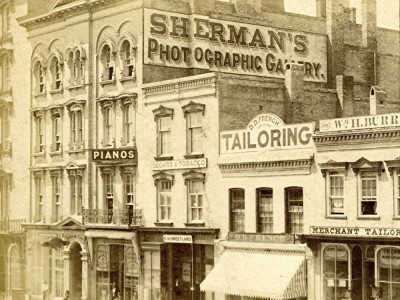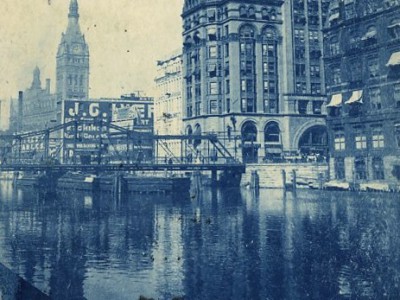Real Estate
Winners & Great Photos of 2014 Mayor’s Design Awards
From the new Pizza Man to Radio Milwaukee to Junior House Lofts, the winners span many styles and neighborhoods. Photo Galleries of every winning design.
May 21st, 2014 by Jeramey JanneneSherman’s Photographic Gallery, 1867
His stereoviews captured early Milwaukee and his studio was located near Wisconsin Ave. on what later became Broadway.
May 20th, 2014 by Jeff BeutnerCity Commission Says Yes to Adventure Rock
Zoning change approved for planned 4-story, 46-unit apartment complex and indoor climbing wall in Riverwest.
May 20th, 2014 by Mac WrittJS Critic Likes New Art Museum Addition
Schumacher gives it thumbs up but big issues remain.
May 19th, 2014 by Bruce MurphyPower Broker Bill Drew’s Home Office
Drew and his wife, consultant Mary Cannon, made a lot of money working from their lovely West Side colonial home. It's on the Spaces and Traces tour tomorrow.
May 16th, 2014 by Michael HorneFour Plans to Save the Bucks
But can any of the plans create the new NBA arena they need?
May 15th, 2014 by Bruce MurphyDowntown Power Brokers Mull Expanded Convention Center
Leaders of Wisconsin Center and the Bradley Center consider key changes for downtown facilities.
May 15th, 2014 by Michael HorneMarquette’s New IVY on Fourteenth
Photographic tour of building nearing completion that will boast 80 apartments and street-level retail.
May 14th, 2014 by Jeramey JanneneBiking With The Mayors
Madison's former mayor joins Tom Barrett and various city employees for the annual Bike to Work.
May 13th, 2014 by Dave ReidThe Underwater City
New study ranks Milwaukee as 16th hardest hit city, with 40% of homes underwater. But that may understate the problem.
May 13th, 2014 by Bruce MurphyPostcard of Milwaukee, 1900
One of the earliest postcards done of the city shows Downtown along the river.
May 13th, 2014 by Jeff BeutnerPaul Jakubovich’s 1927 English Tudor
The city's preservation planner calls the shots on changes to historic buildings and districts -- as well as in his own home.
May 12th, 2014 by Michael Horne





















